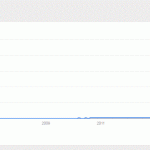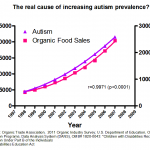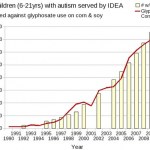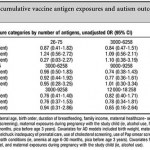epidemiology
Alternative medicine, by definition, consists of medicine that either has not been shown to work or has been shown not to work. To paraphrase an old adage yet again, medicine that has been shown to work with an acceptable risk-benefit ceases to be "alternative" and becomes simply "medicine."
Unlike the case for many conditions commonly treated with alternative medicine, whether or not a treatment works against cancer is determined by its impact on the hardest of "hard" endpoints: Survival. A patient either survives his cancer or he does not. Even the "softer" endpoints used to assess the…
The news over the past 24 hours has exclaimed over and over:
HIV's Patient Zero Exonerated
How scientists proved the wrong man was blamed for bringing HIV to the U.S.
Researchers Clear "Patient Zero" from AIDS Origin Story
H.I.V. Arrived in the U.S. Long Before ‘Patient Zero’
Gaetan Dugas: "patient zero" not source of HIV/AIDS outbreak, study confirms
HIV's supposed "Patient Zero" in the U.S., Gaetan Dugas, is off the hook! He wasn't responsible for our outbreak!
This is presented as new information.
Gaetan Dugas, from Wikipedia.
It is not, and I think by focusing on the "exoneration" of…
The 2013-2016 West African Ebola virus outbreak altered our perception of just what an Ebola outbreak could look like.
While none of the three primary affected countries--Liberia, Sierra Leone, and Guinea-have had a case since April 2016, the outbreak resulted in a total of over 28,000 cases of Ebola virus disease (EVD)--65 times higher than the previous largest EVD outbreak, and more than 15 times the total number of cases of all prior EVD outbreaks combined, from the virus's discovery in 1976 to a concurrent (but unrelated) outbreak in the Democratic Republic of Congo in 2014.
In March 2016…
E. coli, from Wikipedia commons
We've been expecting it, and now it's here.
Yesterday, two article were released showing that MCR-1, the plasmid-associated gene that provides resistance to the antibiotic colistin, has been found in the United States. And not just in one place, but in two distinct cases: a woman with a urinary tract infection (UTI) in Pennsylvania, reported in the journal Antimicrobial Agents and Chemotherapy, and a positive sample taken from a pig's intestine as part of the National Antimicrobial…
As you've probably seen, unless you've been living in a cave, Zika virus is the infectious disease topic du jour. From an obscure virus to the newest scare, interest in the virus has skyrocketed just in the past few weeks:
I have a few pieces already on Zika, so I won't repeat myself here. The first is an introductory primer to the virus, answering the basic questions--what is it, where did it come from, what are its symptoms, why is it concerning? The second focuses on Zika's potential risk to pregnant women, and what is currently being advised for them.
I want to be clear,…
Analyzing online searches and social media activity has often been suggested as a way to track and maybe even predict the spread of diseases. And it’s a great idea — if it’s done right, it could offer public health workers real-time surveillance and a jumpstart at containing dangerous outbreaks. But there’s a hitch. How can we attempt to decipher between online activity triggered by the possibility of actual disease symptoms and online activity triggered by simple curiosity?
That was the question Sherry Towers and her colleagues set out to answer. At the very least, they wanted to gain some…
I've been paying attention to the antivaccine movement a long time. Indeed, it's been just under a decade since I made what was my first big splash in the blogosphere, namely my particularly "Insolent" takedown of Robert F. Kennedy, Jr.'s conspiracy-laden, pseudoscience-spewing super-concentrated antivaccine nonsense known as Deadly Immunity. So here it is, almost ten years later, and RFK, Jr. is still around, spewing the same nonsense that he did ten years ago, except that this time he's using Holocaust analogies to describe the vaccination program. Unfortunately, some things never seem to…
Dedicated to lilady.
One of the disadvantages of writing for this blog is that sometimes I feel as though I spend so much time deconstructing bad science and pseudoscience in medicine that I'm rarely left with the time or the opportunity to discuss some interesting science. Of course, even when I do that, usually it's in the context of that very same bad science or pseudoscience, and this post won't be different. Still, there was some interesting science with respect to vaccines published last week in Science, and I think it's worth looking over. The only thing that surprises me is that the…
The human mind is amazing in its ability to compartmentalize. Many are the times when I've come across people who seem reasonable in every other way but who cling tightly to one form of pseudoscience or another. On the other hand, as I've noticed time and time again, people whose minds have a proclivity for pseudoscience tend not to limit themselves to just one form of pseudoscience. Indeed, my surgical and skeptical bud Mark Hoofnagle coined a term for this latter phenomenon, namely "crank magnetism." It's basically a pithy term to describe how people who are into one form of pseudoscience…
She's baa-aack.
Remember Stephanie Seneff? When last Orac discussed her, she had been caught dumpster diving into the VAERS database in order to torture the data to make it confess a "link" between aluminum adjuvants in vaccines and acetaminophen and—you guessed it!—autism. It was a bad paper in a bad journal known as Entropy that I deconstructed in detail around two years ago. As I said at the time, I hadn't seen a "review" article that long and that badly done since the even more horrible article by Helen Ratajczak entitled Theoretical aspects of autism: Causes–A review (which, not…
A few weeks ago, I wrote a post in which I explained why wearing a bra does not cause breast cancer. After I had finished the post, it occurred to me that I should have saved that post for now, given that October is Breast Cancer Awareness Month. The reason is that, like clockwork, pretty much every year around this time articles touting various myths about breast cancer will go viral, circulating on social media like Facebook, Twitter, Pinterest, and Tumblr like so many giant spider-microbes on the moon a week ago. Sometimes, they’re new articles. Sometimes they’re old articles that, like…
(As previously, spoilers abound)
So on this week's Walking Dead soap opera, we find that Daryl/Michonne's group is still out and about searching for medical supplies. Back at the prison, the food situation is dire (apparently all the food stores were in the cell block where the infection broke out), so Rick and Carol head out to look for both medicines and food from the local 'burbs. During their outing, discussion ensues of Carol's attempt to stop the prison's apparent influenza outbreak by killing two people who, at that point, were the only ones showing symptoms of disease. Rick decides he…
NOTE: There is a followup to this post here.
Last night, I had a function related to my department to attend, which means that I didn't get home until after 9 PM. However, two blog posts have come to my attention that demand a response from me because they involve an old "friend" of the blog. This "friend" is someone whose scientific and medical misadventures over the last eight years since I became aware of him are legion. This is someone whose "biomedical" treatments for autism were based on an unshakeable belief that mercury in thimerosal, the preservative that was used in many childhood…
When I asked Teresa Schnorr why we should be worried about the loss of a little-known occupational health data gathering program, she quoted a popular saying in the field of surveillance: "What gets counted, gets done."
Schnorr, who serves as director of the Division of Surveillance, Hazard Evaluations and Field Studies at CDC's National Institute for Occupational Safety and Health (NIOSH), was referring to the Adult Blood Lead Epidemiology and Surveillance program (ABLES), a state-based effort that collects and analyzes data on adult lead exposure. For more than two decades, NIOSH has been…
Last week, the Journal of Pediatrics published a study that did a pretty good job of demolishing a favorite antivaccine trope used to frighten parents. In fact, it's one of the most effective of antivaccine tropes, as evidenced by a large number of parents who are generally pro-vaccine expressing doubts when asked about this particular antivaccine slogan. I'm referring, of course, to the "too many too soon" slogan, in which antivaccinationists try to imply that the current vaccine schedule somehow "overwhelms" an infant's immune system and leads to autism by some unknown and undemonstrated…
There are some days when I know what my topic will be—what it must be. These are times in which the universe gives the very appearance of handing to me my topic for the day on the proverbial silver platter with a giant hand descending from the clouds, pointing at it, and saying, "Blog about this, you idiot!" Usually, it's because a study is released or something happens or a quack writes something that cries out for rebuttal. Whatever it is, it's big and it's unavoidable (for me, at least).
This is one of those days.
The reason it's one of those days is because just last Friday, as I was…
I don't always blog about stories or studies that interest me right away. Part of the reason is something I've learned over the last eight years of blogging, namely that, while it's great to be the firstest with the mostest, I'd rather be the blogger with the mostest than the firstest. I've learned this from occasionally painful experience, although I'd be lying if I didn't admit that in part this is a rationalization for the fact that I have a demanding day job that keeps me from jumping all over stories and studies of interest in the way that some bloggers can. There's also the simple fact…
I know I dump on a website known as The Thinking Moms' Revolution (TMR), but I do so with good reason. Given what a wretched hive of antivaccine scum and quackery that website is, rivaling or surpassing any antivaccine website I can think of, even the blog equivalent of the great granddaddies of wretched hives of antivaccine scum and quackery, the National Vaccine Information Center (NVIC), and, of course, Age of Autism. As a result, increasingly I've been taking more and more notice of this (not so) Thinking Mom's Devolution. As a result, I became aware of a particularly egregious piece of…
In a previous post here, I discussed the scourge of cholera – a waterborne disease largely vanquished in the wealthier nations by our water and wastewater treatment systems. Unfortunately, it remains widespread and lethal. Cholera is perhaps the most common and serious water-related disease, directly associated with the failure to provide safe drinking water and adequate sanitation to billions of people. Millions – mostly young children – die unnecessary deaths each year from these diseases.
This week is the 200th anniversary of the birth of the man who would help settle, once and for all,…
Despite its reputation as a scourge of antiquity, Yersinia pestis--the bacterium that causes bubonic plague--still causes thousands of human illnesses every year. In modern times, most of these occur in Africa, and to a lesser extent in Asia, though we have a handful of cases each year in the U.S as well.
When Y. pestis was first confirmed as the cause of bubonic plague during an 1894 outbreak in Hong Kong, most people assumed that we also now knew the cause of the 14th-century Black Death, and the later plague outbreaks that resurfaced periodically. However, there has been lingering…








